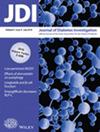Association among circulating erythropoietin-producing hepatoma A2, progranulin, and kidney function in individuals with diabetes
Abstract
Background
Erythropoietin-producing hepatoma A2 (EphA2), a receptor for progranulin (PGRN), which is a growth factor associated with metabolic disorders, is implicated in inflammation and atherosclerotic diseases. Since both EphA2 and PGRN play roles in diabetic kidney disease (DKD) and cardiovascular disease (CVD), this study examined their association with renal function and CVD markers in individuals with diabetes. In addition, the diagnostic value of EphA2 and PGRN in predicting renal impairment was evaluated.
Methods
Circulating EphA2 and PGRN levels were measured using enzyme-linked immunosorbent assay in 735 participants with diabetes. Clinical data, including biometric parameters, physiological measurements, and comorbidities, were collected for analysis.
Results
Both EphA2 and PGRN levels positively correlated with older age, elevated blood pressure, higher urinary albumin-to-creatinine ratio (UACR), and brain natriuretic peptide (BNP) levels but negatively correlated with estimated glomerular filtration rate (eGFR). Multivariate logistic regression analysis revealed that EphA2 was an independent predictor of eGFR <60 mL/min/1.73 m2, even after adjusting for UACR and CVD risk factors and glycated hemoglobin. Although PGRN was also independently associated with eGFR <60 mL/min/1.73 m2, its association was weaker than that of EphA2. Conversely, when UACR ≥30 mg/g was used as the dependent variable, PGRN emerged as a stronger independent determinant than EphA2, even after adjusting for eGFR and CVD risk factors.
Conclusions
EphA2 and PGRN levels are significantly associated with renal function in individuals with diabetes. These findings suggest that EphA2 and PGRN could serve as novel biomarkers for kidney impairment, independent of established CVD markers in this population.


 求助内容:
求助内容: 应助结果提醒方式:
应助结果提醒方式:


